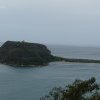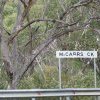Bowen (Toura Bungaree) and his wife Maria, and daughters Jonza, Nan, Theda (Jane), and son Mark, move to Pittwater, near Barrenjoey. Bowen has perhaps decided to lead his clan away from the destruction and poverty of Sydney life back to a semi traditional existence.
Bowen may also have been disappointed in British justice. Bowen had requested the Reverend Threlkeld to make representation to the NSW Attorney General for the unsuccessful prosecution of two Aboriginal men, Murrell and Bummaree for the murder of his brother-in-law Jabinguy and another man. His appeal to the Attorney General was unsuccessful. Bowen returned to find his country much altered with traditional coastal fishing grounds blocked off to them and borders from farms and roads.
Bowen and other members of his clan find work employed as black trackers and also catch and trade fish with settlers. He works beside Customs Officer Howard and is friends with local farmer John Farrell. He is described as a valuable asset to the force. The Sydney Herald reports that Bowen has given information that leads to the capture of three bush rangers. “A black fellow named Bowen told Brophy that the other bushrangers were on another island near Mooney Mooney Creek”. (Sydney Herald, 17 April 1837)
Bowen is a very effective black tracker in detecting illegal stills in the upper reaches of McCarrs Creek, Church Point. He leads John Howard from the Customs House at Barrenjoey, Pittwater, up the creek to where a man William Farr is detained. Howard recognizes Bowen’s skills and recommends to the Collector of Customs in Sydney that he should ”have a second boat which would cost about four hundred pounds and enable him to get a living for himself and family consisting of two daughters and a son. … as he will be liable to insult and oppression for having aided me”. Later Howard writes “I am reluctant to employ (Bowen) … without the protection of a constable as I have reason to believe that violence would be used towards him.” (Archives Office of NSW Reel 4/2723)
 drawn by Mikhailov, 1820, courtesy AIATSIS.thumbnail.jpg)


